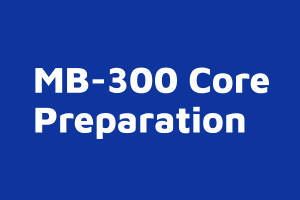Description
5-day live online MB-330 SCM exam prep course.
The delivery is per our Prepare-Participate-Practice (3P) methodology.
What you get
- Welcome email to students
- Link to Dashboard in AXcademy – one-stop for all information
- Overview of courses
- Links to live sessions
- Prepare materials
- Live recordings and presentations used
- Practice exercises
- Link to Dashboard in AXcademy – one-stop for all information
- Preparation materials
- Videos, presentations, et al.
- Participate
- Live sessions – 5 days each with 2 x 3-hour live sessions
- Recorded live session (accessible for 30 days after the course)
- Presentations used
- Practice materials
- Hands-on exercises, deep dive documentation, et al.
- Standard MB-330 VM (D365FO training environments/sandboxes with standard demo data) is provided by AXcademy for each student
- access for 180 days.
Curriculum MB-330 Supply Chain Management
Overview
- Implement product information management
- Implement inventory and asset management
- Implement and manage supply chain processes
- Implement warehouse management and transportation management
- Implement master planning.
Details
Implement product information management
Create and manage products
- Create and release products and product variants
- Create and apply product templates
- Create bills of materials (BOMs) and BOM versions
- Create and configure category hierarchies
- Create and manage product states during the lifecycle of a product
- Create product attributes
- Assign variant-specific item sales tax groups for product variants
Configure prerequisites for products
- Configure inventory dimensions, including storage, tracking, and product dimension groups
- Configure item model groups
- Configure reservation hierarchies
- Configure unit sequence groups
Configure additional product details
- Create and assign bar codes and Global Trade Item Number (GTIN) codes
- Configure product unit conversions
- Configure default order settings
- Configure product filter codes for warehouse operations
Manage inventory pricing and costing
- Configure and maintain costing versions for standard and planned costs
- Configure price groups
- Configure items with standard costs
- Configure default item prices, purchase and sales prices, and discounts in trade agreements
Implement inventory and asset management
Configure inventory management
- Configure inventory management parameters
- Configure inventory reports
- Configure ABC classifications
- Configure the cost basis type and pricing template for commodity pricing
Manage and process inventory activities
- Create and process journals, including BOMs, item arrival, output order, transfer, movement, inventory adjustment, and counting journals
- Create and process transfer orders
- Manage the inventory closing and adjustment process
- Configure and perform inventory closings and adjustments
- Apply inventory blocking manually
- Create batch disposition codes
Manage quality
- Configure and process nonconformances
- Configure quality associations
- Configure components for the quality control process
- Process quality orders
- Process quarantine orders
- Configure inventory blocking by using a quality order
Configure asset management
- Create and manage work orders
- Create and configure assets
- View and manage capacity for work orders
- Configure work order settings
- Schedule preventive maintenance and reactive maintenance
- Manage and configure asset loans
Implement asset management
- Configure maintenance plans
- Configure functional locations
- Manage maintenance requests
- Manage work orders consumption
- Manage work order scheduling
Implement and manage supply chain processes
Implement procurement and sourcing
- Create and maintain vendors
- Create and manage purchase requisitions, requests for quotation (RFQs), and purchase orders (POs)
- Create purchase agreements and vendor rebates
- Configure and process consignment inventory
- Manage over and under deliveries and delivery schedules
- Configure procurement categories, charge codes, and purchasing policies
- Configure vendor collaboration features
- Create and process vendor returns
- Manage registration and product receipt
- Configure procurement workflows
Implement landed cost
- Configure landed cost parameters and voyage statuses
- Create and process voyage with purchase orders or transfer orders
- Configure cost estimations, tracking control center, over/under tolerance setup, and journey templates
- Configure cost type codes and auto-costs
Implement common sales and marketing features
- Create and maintain customers
- Configure sales agreements
- Configure and process sales quotations, sales orders, reservations, and sales returns
- Configure sales groups and commissions
- Configure and process intercompany orders
- Configure customer rebates
- Configure and manage delivery schedule, available-to-promise (ATP), and capable-to-promise (CTP)
Implement warehouse management and transportation management
Configure warehouse management
- Create sites, warehouses, locations, location formats, location profiles, location types, and zones
- Create and manage warehouse workers
- Configure work policies and work breaks
- Implement location directives
- Configure wave, load, and work templates
- Configure mobile device menus, menu items, and display settings
- Create and print labels, including product, wave, GS1 label segments, and license plate labels
- Configure packing dimensions
Perform warehouse management processes
- Configure and process replenishment
- Manage load planning workbench
- Configure and process inventory movements for advanced warehousing
- Create cycle counting work and perform cycle counting
- Process inbound and outbound orders by using the mobile app
- Configure containerization and packaging options
- Configure and process cross docking
Implement transportation management
- Configure shipping carriers and carrier groups
- Perform planning and executing of loads and shipments
- Configure and generate freight bills and invoices
- Configure route plans and guides
- Configure route and rate engines
- Configure and use dock appointment scheduling
- Reconcile freight by using manual or automatic processes
Implement master planning
Configure master planning
- Set up coverage groups and item coverage
- Configure and maintain master planning parameters and master plans
- Define positive and negative days
- Define action messages, delay messages, and time fences
- Configure period templates
Manage master plans
- Run master planning and analyze the results
- Evaluate and process planned purchase and transfer orders
- Set up and use the Supply Schedule form
- Configure safety margins
- Configure and process safety stock journals.



